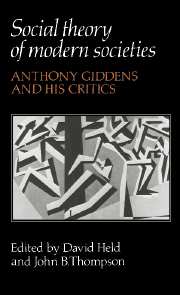Book contents
- Frontmatter
- Contents
- List of contributors
- List of abbreviations
- Editors' introduction
- 1 Social theory as critique
- 2 Hermeneutics and modern social theory
- 3 The theory of structuration
- 4 Models of historical trajectory: an assessment of Giddens's critique of Marxism
- 5 Capitalism, nation-states and surveillance
- 6 War and the nation-state in social theory
- 7 Only half the story: some blinkering effects of ‘malestream’ sociology
- 8 Citizenship and autonomy
- 9 Presences and absences: time–space relations and structuration theory
- 10 Space, urbanism and the created environment
- 11 On the (ir)relevance of structuration theory to empirical research
- 12 A reply to my critics
- Select bibliography
- Index
7 - Only half the story: some blinkering effects of ‘malestream’ sociology
Published online by Cambridge University Press: 24 November 2009
- Frontmatter
- Contents
- List of contributors
- List of abbreviations
- Editors' introduction
- 1 Social theory as critique
- 2 Hermeneutics and modern social theory
- 3 The theory of structuration
- 4 Models of historical trajectory: an assessment of Giddens's critique of Marxism
- 5 Capitalism, nation-states and surveillance
- 6 War and the nation-state in social theory
- 7 Only half the story: some blinkering effects of ‘malestream’ sociology
- 8 Citizenship and autonomy
- 9 Presences and absences: time–space relations and structuration theory
- 10 Space, urbanism and the created environment
- 11 On the (ir)relevance of structuration theory to empirical research
- 12 A reply to my critics
- Select bibliography
- Index
Summary
Introduction
In writing a chapter about Giddens on women and gender in society, I must first express disappointment that, along with so many other social theorists even today, he has largely ignored these from his field of study. This chapter therefore starts with a critique of what he has omitted, and of some of the consequences of this omission, rather than of a substantive body of Giddens's writings. However, it also shows how the omission of women and gender relations from a supposedly broad social theory, and associated with this, the omission of spheres of social activity particularly associated with women, results in other fallacies and limitations of as great importance, and which have been less commented upon elsewhere. Not only is half of society (and the relationship between that half and the other half) virtually omitted from his analysis, but also, partly by association, half of the activities carried on in that society. I then explore how some of the concepts elaborated by Giddens might usefully be developed further for analysing these areas as well as pointing to how some of the shortcomings in Giddens's work might be made good. Rather than discussing gender relations and ‘women’ in general terms, I have limited my comments here to specific areas of social activity: those that take place in the domestic sphere, and more generally activities concerned with the production of people. These both illustrate some of the more general problems of ignoring women and gender in sociological analysis, and stand in their own right as core areas of social activity which theoretical texts such as those produced by Giddens ought to encompass.
- Type
- Chapter
- Information
- Social Theory of Modern SocietiesAnthony Giddens and his Critics, pp. 147 - 161Publisher: Cambridge University PressPrint publication year: 1989
- 11
- Cited by



